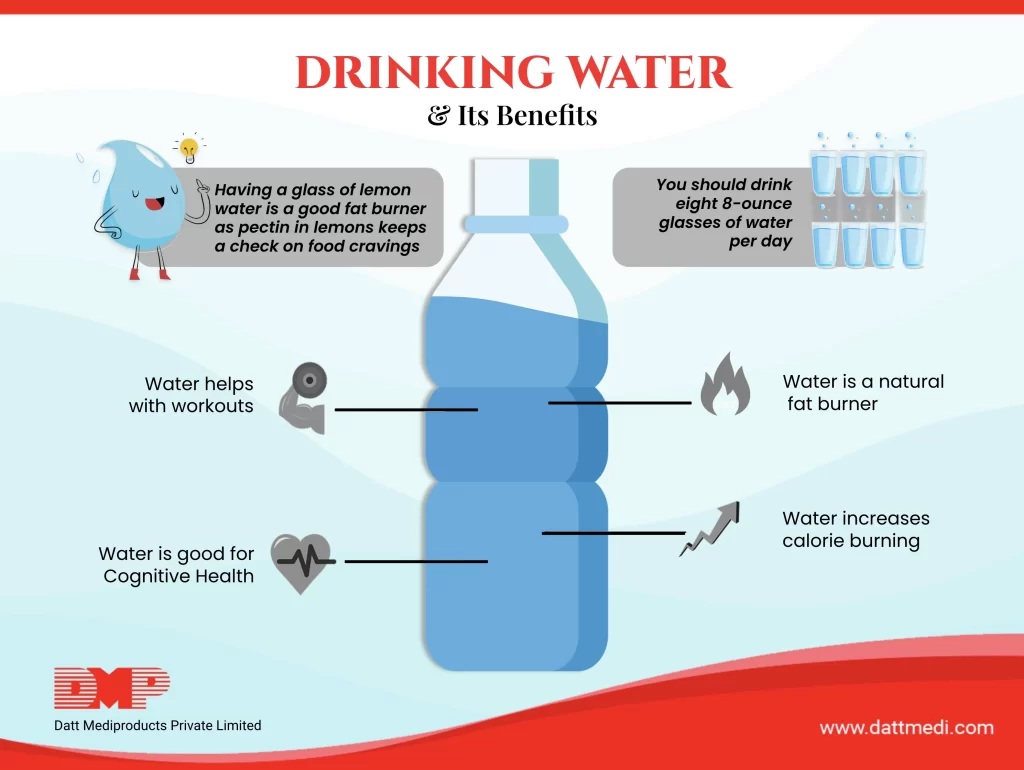
Staying hydrated is cardinal for the human body. Water is one of the main components for good metabolism because the human body is made up of more than 60% water.
Some of the major internal organs such as the heart and brain are made up of even more. If a person is not hydrated enough, it puts a strain on these organs, thereby depleting energy levels, reducing focus, and rising irritability.
We bring to you some healthy benefits of drinking more water and thereby how it helps in losing weight.
Water is a Natural Appetite Suppressant:
Drinking water before meals reaches the satiety levels, thereby making you feel fuller and suppressing hunger. You can even curb your unnecessary hunger if you drink a glass of water. This is documented in several studies, wherein the participants encountered appetite suppression in addition to a decrease in their body weight, fat, and BMI.
Water increases Calorie Burning:
We often ignore the liquid calories we drink each day. Replacing high calorie aerated drinks, sweetened coffee or tea with water or even low-calorie liquids such as green tea is a good option for long term weight loss benefits.
TIP
Having a glass of lemon water is a good fat burner as pectin in lemons keeps a check on food cravings.
Water helps to Remove Waste from the body:
Proper hydration helps to flush out toxins and inflammation from the body. Dehydration often leads to several digestive issues such as diarrhea, indigestion, and constipation. A person may feel bloated, adding inches to the waist, and tired. Water keeps the body waste moving by making the hardened stool soft and loose.
Drinking-Water can reduce overall Liquid Calorie Intake:
Dehydration may often be mistaken as hunger signals, making you reach for food instead of water. Proper hydration is the most immediate way to eat less and feel better. This way important body organs such as the heart and brain get enough fuel for better decision making, have more energy and reduce confusion like the thirst for hunger.
Water is good for Cognitive Health:
With a hydrated body, our brain functions efficiently. A study published in the Journal of the American College of Nutrition shows that even slight levels of dehydration (as little as 2% water loss) have a tendency to impair your task performance that requires attention, cognitive functions, focus, physical movement, and immediate memory skills.
Water is a Natural Fat Burner:
Water positively affects our metabolism. When dehydrated, our body is not able to metabolize fat and carbohydrates, the process known as lipolysis. Water not only helps to burn the daily accumulated fats but the stored fats too. It is often recommended to drink ice cold water to boost your metabolism as the body has to work harder to warm up the cold water, ultimately boosting metabolism.
Water helps with Workouts:
Water not only helps in the effective functioning of our internal organs, but it also assists in the proper movement of our muscles, joints, and connective tissues, thereby reducing the chances of fatigue and muscular cramps. Hydration makes the joints lubricated making you hit the gym harder and for a longer time period.
Follow us @dattmediproducts for more health-related blogs and tips.
Stay Hydrated, Stay Healthy.




